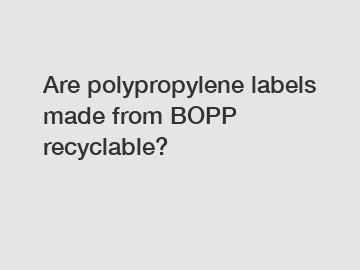Polypropylene labels, commonly known as BOPP labels, are widely used in various industries due to their durability, flexibility, and resistance to water and oil. However, a question that frequently arises is whether these labels are recyclable. In this article, we will delve into the recyclability of polypropylene labels made from BOPP and discuss the impact of these labels on the environment.
Recyclability of BOPP Labels.
Polypropylene labels made from BOPP (Biaxially Oriented Polypropylene) are indeed recyclable. BOPP is a type of plastic that can be recyclable through mechanical or chemical processes. These labels can be collected along with other plastics and sent to recycling facilities where they are processed and turned into new products.

One of the advantages of recycling polypropylene labels is that they can be melted down and reused without losing their properties. This helps reduce the amount of plastic waste in landfills and minimizes the need for virgin plastic production, which in turn conserves natural resources and energy.
Environmental Impact of BOPP Labels.
While polypropylene labels made from BOPP are recyclable, their environmental impact goes beyond just recyclability. These labels are produced using fossil fuels, which contribute to carbon emissions and climate change. Additionally, if not disposed of properly, BOPP labels can end up in the environment, polluting waterways and harming wildlife.
To mitigate the environmental impact of BOPP labels, it is crucial to prioritize recycling and proper disposal practices. By recycling these labels, we can reduce the amount of plastic waste that ends up in landfills or the environment, thereby minimizing the overall carbon footprint associated with their production and disposal.
Promoting Sustainable Labeling Practices.
In light of the environmental challenges posed by plastic pollution, many companies are adopting more sustainable labeling practices. This includes using recyclable materials such as BOPP for labels, implementing recycling programs, and educating consumers about the importance of recycling.
Companies can also explore alternative labeling options, such as compostable labels or labels made from recycled materials, to further reduce their environmental impact. By prioritizing sustainability in labeling practices, businesses can demonstrate their commitment to environmental stewardship and inspire others to follow suit.
Conclusion.
In conclusion, polypropylene labels made from BOPP are recyclable and can be processed into new products through recycling facilities. While recycling is a vital step in reducing the environmental impact of these labels, it is also essential to consider the entire lifecycle of BOPP labels, from production to disposal.
By promoting sustainable labeling practices, businesses can help minimize plastic waste, conserve natural resources, and reduce carbon emissions. Together, we can work towards a more sustainable future where recycling is a standard practice, and plastic pollution is significantly reduced.
If you have any questions about the recyclability of polypropylene labels made from BOPP or would like to learn more about sustainable labeling solutions, please feel free to contact us.
For more information, please visit bopp material properties, bopp silver film, packaging material bopp.



Comments
All Comments (0)